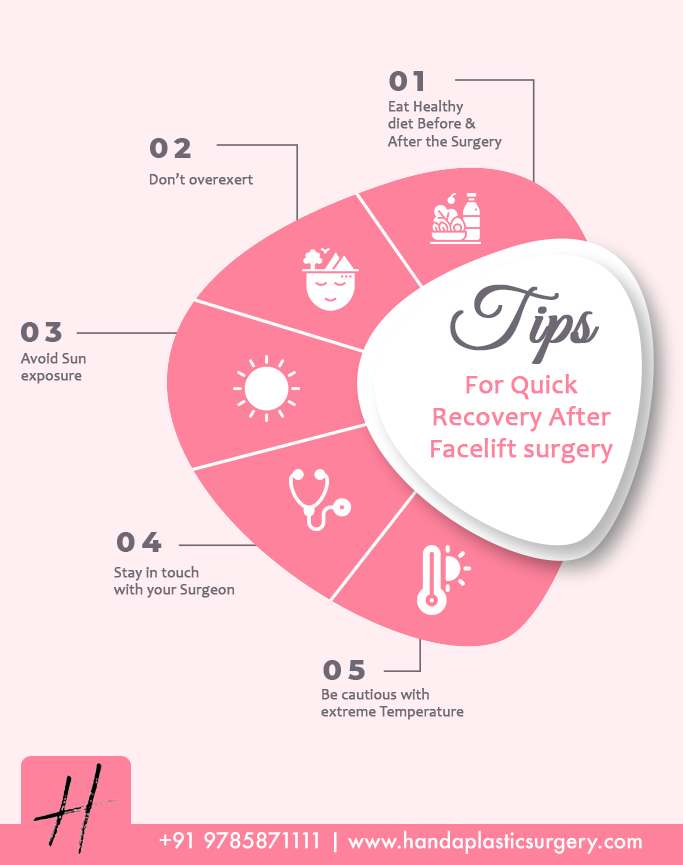Have you ever wondered how a superstar, even in their forties, manages to appear so young with a beautiful face and tight skin. Almost everyone is affected by ageing in the same way, but their best-kept secret is Facelift Surgery. Facelift surgery is a relatively frequent surgery that tightens the skin on your face and neck to give you a more youthful appearance.
Although there are other options of facelift without surgery, they are not as effective as surgical facelift. A single facelift operation can take years off your face by sculpting your face, lifting your neck, and removing extra loose skin on your face. Because of these advantages, it is one of the most patient-satisfying plastic surgeries.
However, it is natural that you have a lot of concerns regarding the facelift surgery recovery guide and facelift surgery expectations. If you are someone with similar questions then the article below will provide you with all the answers.
Table of Contents
Feel free to skip ahead if one topic catches your eye
- What happens during Facelift Surgery?
- Expectations during the Recovery Phase
- Potential Complications After Facelift Surgery
- Precautions after Facelift Surgery
- Cost of Facelift Surgery in Delhi
1.What happens during Facelift Surgery?
Facelift surgery typically entails treatments such as tightening the skin on the face. The process also involves sculpting the muscles of the face and neck, which contributes to a more youthful appearance. Excessive loose skin is also removed, and the incisions are then sutured together.
- In most cases, the operation is performed after you have been sedated and placed under anaesthesia, ensuring that you do not feel anything during the process.
- Making the incisions is the next stage. These incisions are made around the face’s temples. Different procedures and incisions are employed based on the type of technique used for your particular operation.
- When the neck has extra loose skin, a neck lift is usually performed. In this method, the incisions are created around the ear lobes and down to the lower scalp.
- The conventional facelift technique is making incisions from the temples to the ears, then to the lower scalp at the back. This is a comprehensive procedure that addresses correction in both the neck and the face.
- Facelift with a little incision: When only a small portion of your face has to be treated, this procedure is employed.
The fat in the face is then redistributed, excess skin is removed and the sutures are closed. To keep the sutures in place, the doctor dresses the whole region and covers it with bandages.
2.Facelift Surgery Expectations during the Recovery Phase
Your face will be swollen and bruised immediately following surgery, and you will be wrapped in bandages. But you should not be alarmed at this stage. These are fairly frequent symptoms immediately following surgery, and they do not last forever. The doctor wraps you in bandages that apply pressure to your face and help reduce swelling and bruising.
It’s impossible to predict the precise duration of facelift surgery recovery since a variety of factors influence recovery time, including age, health, and the degree of surgery performed. Following are the common facelift surgery expectations during the recovery phase:
- You may experience discomfort and swelling around your face region immediately following surgery. This is a frequent side effect of the procedure. This typically subsides and you regain normalcy once the doctor administers the pain relievers.
- The swelling normally starts to go down in the second week, and this is when most patients begin to feel normal again and may resume their normal activities.
- The sutures are removed from the face in the third to fourth week, depending on how the face is healing. The residual swelling that is present in the face will start to go down at this point, and this is when you will see your actual face after the operation.
- This is typically a safe time to resume your working and enjoying routine activities.
- Most patients make a full facelift surgery recovery and can return to their usual lives one month following surgery. Minor swelling or bruising may persist, but it will fade with time.
3.Potential complications after Facelift Surgery?
Facelift surgery recovery, like any other cosmetic or medical procedure, has some minor complications. It is critical to understand that everyone is unique, and not everyone has the same problems following surgery. The following are some examples of common face lift surgery complications:
- Bleeding and blood clots: surgery can cause minor bleeding and the development of blood clots under the skin. This is a rare consequence, and if you notice any symptoms or have any concerns, you should seek medical advice.
- Skin abnormalities: After facelift surgery, there can be certain irregularities in the skin, such as hardness and lumpiness. These issues usually go away with time by proper massaging, but they can sometimes persist and require extra surgery to be rectified.
- Infection is a relatively rare problem that can develop if adequate hygiene is not maintained, but it is curable. In instances of infection, antibiotics are given, and drainage is performed.
- Numbness: Numbness is a common facelift surgery expectation as the surgery is a bit invasive. In certain cases, there can be persistent numbness in the skin and neck as a result of nerve damage.
- Swelling and bruising are two of the most frequent post-surgery signs and consequences. Even after taking regular medicine, this swelling can be persistent and last for months. It is advised that you consult with your doctor about it. Swelling is a common reaction of the body to any injury, and the swelling decreases once the body starts recovering.
- Scarring: Incisions created during the facelift surgery can occasionally result in the formation of scars on the face. Commonly, the scar left by the procedure fades with time.
- Hair Loss: A patient may experience an increase in hair loss following surgery because the body is in a state of shock. This can result in excessive hair loss. But, this is just temporary and should not be a cause for concern. Once the body starts to heal, the hair loss will be regulated again.
- After the operation, there may be some skin discolouration, which will fade as the healing process begins.

4.Precautions after a Facelift surgery
It is commonly stated that going into surgery is the easy part; the tough part is taking proper care of yourself afterwards. Given below is a common facelift surgery recovery guide:
- Following the surgery, you must get plenty of rest, give your body enough time to recover, and follow all of your doctor’s instructions.
- The most important point is to avoid any strenuous physical activity following surgery. There is weakness after surgery since the entire body’s energy is devoted to recover from the procedure. Excessive physical activity can potentially cause wound rupturing and consequences such as excessive bleeding.
- Another important consideration is to follow a liquid diet for the first several days before gradually transitioning to solid meals. This is because the muscles of the cheek are still healing. Chewing excessively might damage the muscles and delay recovery. After some time you can start eating solid meals according to your doctor’s recommendations.
- It is typically advised that you consume a sufficient quantity of protein and carbs in your diet as this aids in the healthy healing of the body.
- Once the wounds have healed, the doctor usually recommends using an elastic band or compression garment around the neck and face. It aids in the reduction of long-term swelling and bruising while also maintaining the face in shape.
- Another key point in facelift surgery recovery guide is to avoid smoking and do not even expose yourself to secondhand smoke, since this can cause further problems.
- Excessive swelling can be alleviated by applying ice to the face. Ice can help numb the nerve endings that cause pain and decrease swelling.
- After a facelift, it is critical to keep your head elevated. This aids in the decrease of swelling.
5.Cost of Facelift Surgery in Delhi
The cost of facelift surgery is determined by a variety of factors.
- Several preoperative examinations must be completed before the operation to verify that you are in good physical health to undergo the procedure. The body examination involves blood and other tests to ensure your eligibility.
- When you have a facelift, you’re also paying for the surgeon’s experience. A good surgeon will undoubtedly take extra steps to ensure that you receive the finest possible care. The cost may differ depending on the surgeon consulted. Dr Handa’s clinic has the best cosmetic & plastic surgeon in Delhi who has performed numerous facelift operations in his career
- The cost of the operation is also determined by the clinic that is consulted for the procedure as well as the clinic’s infrastructure.
- The cost of your facelift treatment is also determined by the type of technique you select for your operation.
- Medication and post-operative care are two more factors that might affect the cost.
Takeaway
Dr Handa’s Clinic is outfitted with cutting-edge equipment and highly skilled surgeons, assuring the best Facelift Surgery in Delhi to their patients.
A team of highly dedicated and experienced individuals ensures that every step of the procedure is tailored to your specific needs.


